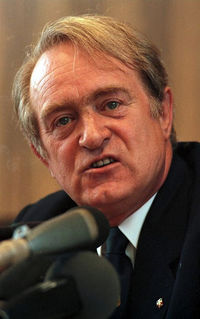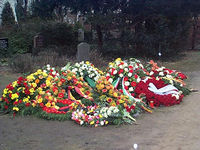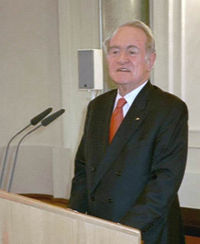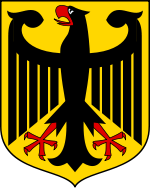Johannes Rau
| Johannes Rau | |
 Johannes Rau in 1986 |
|
|
|
|
|---|---|
| In office 1 July 1999 – 30 June 2004 |
|
| Chancellor | Gerhard Schroeder |
| Preceded by | Roman Herzog |
| Succeeded by | Horst Köhler |
|
Minister-President of
North Rhine-Westphalia |
|
| In office 1978–1998 |
|
| Preceded by | Heinz Kühn |
| Succeeded by | Wolfgang Clement |
|
President of the German Bundesrat
|
|
| In office 1982–1983 |
|
| President | Karl Carstens |
| Chancellor | Helmut Kohl |
| Preceded by | Hans Koschnick |
| Succeeded by | Franz Josef Strauss |
|
|
|
| Born | 16 January 1931 Wuppertal, Germany |
| Died | 27 January 2006 (aged 75) Berlin, Germany |
| Nationality | German |
| Political party | Social Democratic Party of Germany |
| Spouse(s) | Christina Rau |
| Profession | Journalist |
| Religion | Evangelical Church in the Rhineland |
| Signature | |
Johannes Rau (16 January 1931 – 27 January 2006) was a German politician of the SPD. He was President of Germany from 1 July 1999, until 30 June 2004, and Minister-President of North Rhine-Westphalia from 1978 to 1998.
Contents |
Education and work
Rau was born in the Barmen part of Wuppertal, Rhine Province, as the third of five children. His family was strongly Protestant. As a schoolboy, Rau was active in the Confessing Church, a circle of the German Protestant Church which actively resisted Nazism.
Rau left school in 1949 and worked as a journalist and publisher, especially with the Protestant Youth Publishing House.
Political biography
Rau was a member of the All-German People’s Party (GVP), which was founded by Gustav Heinemann. This party was known for proposing German reunification, from 1952 until it was disbanded in 1957.
In 1958, Rau and his political mentor, Gustav Heinemann, joined the Social Democratic Party of Germany (SPD), where he was active in the Wuppertal chapter. He served as deputy chairman of the SPD party of Wuppertal, and was elected later on to the City Council (1964–1978), where he served as chairman of the SPD Group (1964–1967) and later as Mayor (1969–1970).
In 1958, Rau was elected for the first time as member of the Landtag (state parliament) of North Rhine-Westphalia (NRW). In 1967, he became chairman of the SPD fraction in the Landtag, and in 1970 Minister of Science and Education in the cabinet of Minister President Heinz Kühn. He soon gained a reputation as a reformer. As part of the mass-education campaign of the 1970s, he founded five universities, each at different sites, in North Rhine-Westphalia and initiated Germany’s first distance learning university at Hagen (modelled on the Open University).
In 1977, Rau became Chairman of the North Rhine-Westphalia SPD, and in 1978 Minister President of the state, were he remained until 1998, with four successful elections for the SPD, which became strongest party in the Landtag each time and gained an absolute majority three times, in 1980, 1985, 1990 and finally 1995. From 1995 onwards, Rau led an SPD-Greens coalition in NRW.
In 1987, Rau tried to become chancellor of Germany for the SPD, but his refusal to contemplate forming a coalition with the Green Party meant he could not win the elections against Helmut Kohl’s Christian Democrats (CDU). In 1994, Rau tried for the first time to become Federal President, but lost to Roman Herzog.
Rau twice served as President of the Bundesrat in 1982/83 and 1994/95, and thus deputised for the Federal President. In 1998 Rau stepped down from his positions as SPD Chairman and Minister President, and on 23 May 1999, was elected Federal President by the Federal Assembly of Germany to succeed Roman Herzog (CDU). On 1 July 2004, he was succeeded by Horst Köhler.
In 2000, Rau was the first German head of state since the Holocaust to address the Knesset, the Israeli parliament, in German. This controversial step prompted some Israeli delegates to walk out. However, Israeli President Moshe Katsav supported and praised him for bridging the gap between the two states. Rau had a deep and life-long commitment to bringing reconciliation between Germany and its past.
Following a long history of heart disease, he died a few days after his 75th birthday.


Motto and maxim
The maxim of Rau was “to reconcile, not divide”.
As his personal motto, Rau adopted the Confessing Church dictum “teneo, quia teneor” (I hold because I am held).
In his acceptance speech after his election, Rau claimed “A patriot I will be” because “a patriot is someone who loves his fatherland, a nationalist is someone who despises the fatherlands of the others”. The quote can be attributed to the French writer Romain Gary.
Prizes and medals
Rau was awarded fifteen honorary doctorates.
Private life
Rau was known as a practising Christian (and sometimes titled Bruder Johannes, "Brother John", to ridicule his intense Christian position; however, he sometimes used this term himself). He held lay positions in, and was a member of, the Synod of the Evangelical Church in the Rhineland.
On 9 August 1982, Rau married the political scientist, Christina Delius (born 1956). Christina Rau is a granddaughter of her husband's mentor, Gustav Heinemann, former President of Germany. The couple had three children: Anna Christina, born 1983, Philip Immanuel, born 1985 and Laura Helene, born 1986. Since 1995 Rau was aware of his dangerous aneurysm in the abdominal aorta, but declined an operation out of respect for his office and the upcoming election as president. On 23 July 2000 the operation took place at the University Hospital of Essen. On 18 August 2004, he had to undergo serious heart surgery, in which an artificial heart valve was inserted. Only two months later (19 October 2004) a hematoma in the abdominal cavity was surgically removed.
After leaving office, Rau lived with his family in the federal capital, Berlin. However, they also kept a house in Wuppertal.
Rau died in Berlin on 27 January 2006.
See also
External links
- (English) www.bundespraesident.de: Johannes Rau—Official biography
- (German) online book of condolence for Johannes Rau
| Political offices | ||
|---|---|---|
| Preceded by Heinz Kühn (SPD) |
Minister President of North Rhine-Westphalia 1978 – 1998 |
Succeeded by Wolfgang Clement (SPD) |
| Preceded by Roman Herzog |
President of Germany 1 July 1999 – 30 June 2004 |
Succeeded by Horst Köhler |
| Party political offices | ||
| Preceded by Björn Engholm |
Chairman of the Social Democratic Party of Germany 1993 |
Succeeded by Rudolf Scharping |
|
|||||
|
|||||||
|
|||||||
|
|||||||||||||
|
|||||||

